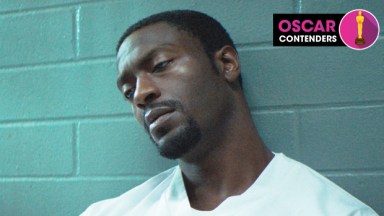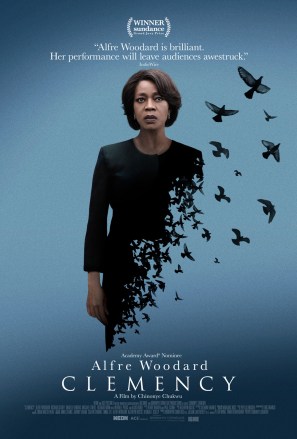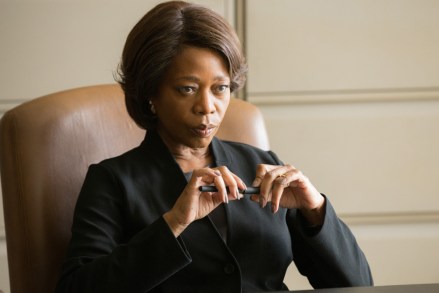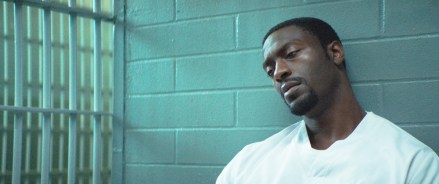
Clemency is one of the best films of 2019. The movie stars Alfre Woodard as Bernadine Williams, a death row prison warden whose job begins to take a psychological toll on her. She must confront her internal demons head-on when she has to execute another inmate by the name of Anthony Woods, played by Aldis Hodge. HollywoodLife sat down with Aldis at the movie’s press junket to discuss this incredible and harrowing role.
Aldis said he signed on to Clemency because the story explores a “very current conversation that’s happening right now in terms of judicial reform, prison reform.” The whole movie was shot in 17 days, with Aldis filming all of his scenes in just 5 days. Before filming, Aldis spoke with the film’s writer-director Chinonye Chukwu to kickstart his research process into playing a death row inmate. He traveled to San Quentin State Prison to talk with death row inmates as well. The actor also discussed the film’s most intense scenes, including the execution scene.
What stood out about the role of Anthony Woods and Clemency that made you want to be a part of this film?
Aldis Hodge: I just thought that it was a great subject matter. The way it was executed was perfect and I saw a great potential to be a part of a very current conversation that’s happening right now in terms of judicial reform, prison reform, all these things. What spoke to me about the film is we get to see the other side of capital punishment from a perspective that we don’t as a society really understand. Hopefully, at least my selfish ambition was, that this film could open up people’s eyes and minds to a conversation that needs to be had internally when it comes to judging brothers and sisters behind bars, when it comes to whether they do or do not support the death penalty, and what action needs to be happening.
What was the research process like for you?
Aldis Hodge: My first introduction to research was speaking to Chinonye Chukwu, writer-director. At that point, she had done about four or five years of deep-dive research. She had volunteered on 14 clemency cases. She started a program called Pens to Pictures in the prison to help prisoners write stories, get them made, things like that. So just talk to her about her perspective on capital punishment and those who are actually condemned, regardless of what they’ve done. Could she see the humanity in them and how? She told me about that and gave me the book I Am Troy Davis about a man who was executed in 2011. She told me about the effect of that and then how the outpouring of support for his clemency, especially coming from prison wardens fighting for his clemency sort of spoke to her. I went to San Quentin and was up there speaking to the brothers serving life sentences, observed how the death row inmates were treated, how differently they were treated, and it all informed every bit of how I saw my character’s reality to be in this film.
What was it like for you to get into that headspace of knowing that Anthony’s life was going to end and it was only a matter of time?
Aldis Hodge: It was definitely an introduction to new thought because oftentimes we think about life and death and varying ways, but not to a point where now this person who’s in prison will literally have his life counted down by other people and he’s going to get that message one day he knows he’s going to die. So you have to think about the precious moments, what the value of life is, and you have to explore your own personal values as a human being. I was really excited about going there because I felt like my personal interest with what this was would help inform or at least transfer onto audiences in terms of understanding a bit more about empathy. Because my idea for this character was to represent hope. In every instance of his having been in prison at this point for 15 years, my idea for him was how do you fabricate hope out of thin air? He has to be his own hope. He has to fight to believe. And that’s some of the most strength that you can really have, to smile in the face of adversity, believe in the face of a loss, things like that. I wanted him to represent simply just hope.
Was the film shot in an actual prison?
Aldis Hodge: It was shot in a defunct jail that was in California. It was crazy. One time they closed the cell that I was in and I’m not sure what happened, I’m not sure if they forgot about me, but they tried to press the button to open it up. It didn’t open. So I was stuck for real. They kept pressing the button trying to open it up but it didn’t open. It makes you think, “Oh, I’m really stuck because you don’t know when you getting out of there.” They got me out of there fairly quickly but, for that moment, I wasn’t freaked out or nothing but I said, “Oh, this is the reality. When you want to go somewhere and you cannot go.” It makes you appreciate freedom in a completely different way.
It wasn’t until the end when Anthony broke down with the chaplain. That was the first time we really saw him lose it as the reality crept in more than ever. That hope that Anthony had just crumbled. What was it like filming that scene?
Aldis Hodge: Crazy enough, I’d worked with Michael [O’Neill] before on a Leverage many years ago. It was cool to sort of reunite on such a very different project and such an important project. It was great because you get to see, I think, the true idea of love. I think in this scene, the pastor who Michael plays, I don’t think it’s about religion. It’s about one man sitting there trying to reason and understand and empathize with another man and without judgment. Which for me, again, is part of the reason why I even took this film because I think it teaches that. But to film all of the hard scenes or all the scenes that I suppose appeared hard on screen, for me, were the most exciting ones to get to because my ambition was so high and, if the scene is really honest and raw, the audience will see that and feel that and they’ll know. So I was, oddly enough, quite elated to jump into those scenes. I was like, “How much harder can we go? How much further can we take this?” So we shot that scene a couple of different times in different ways, but the way they played it out, the way it was edited, I think it fits.
The movie itself doesn’t have that much dialogue. You emote so much with your eyes and movement. Did you like that aspect of this role?
Aldis Hodge: I like it for the effect that it’s had on people who have seen it. I think that, as an actor, it is so much more challenging to be present in a scene when you don’t have anything to say because now one of your major tools, as a performer, is taken away from you. So how can you still speak loudly with saying nothing? I really appreciated the challenge. It also really forces you to do the work of understanding the emotional state of the characters. It’s no longer about what you’re saying and people hanging onto those punctuated words. It’s more about how you really have to understand the state of being of this character is in. For me, it was a great curriculum and really a fantastic education. I had to explore myself a little bit more. The excitement that I have for the audience to see is if they can feel what I was trying to feel or did feel in those moments. Everybody takes a different piece of it, but so far the consistency is that they understood and they felt as hard. I feel like maybe I did complete my task. I’ve been an actor since I was two, and back in the day, people used to call me ugly and I didn’t get jobs because I had really big eyes. My mom said, “Don’t you worry, one of these days they going to want your eyes. They’re going to love your eyes and those eyes are going to make you some money.” She was not lying. Use tools that people try to take away from you.
The execution scene was extremely emotional and intense. The scene only features as Alfre’s character as she watches Anthony die. We never see Anthony die. Were you in the room when this scene was filmed?
Aldis Hodge: I was there. She was looking at me the whole time. I can’t speak for her because I didn’t see her during that. I was playing dead so my eyes were closed but I was there. I suppose the weirdest thing, not necessarily hard, but the weirdest thing was to lie there and deal with the idea of being completely restricted. Because when you’re strapped into that gurney, you are strapped in, you cannot move. It does give you a real sense of the fact that you are helpless, regardless of whether or not we’re shooting. It’s fake but it still was one of those things where you can’t help but think of the real instances where this is what men and women are going through and they don’t actually have a choice. This is just it. This is their last step and it’s a tough reality to swim in. But the thing I love about it is you just submit yourself to the work. You submit yourself to the idea of the scene and the ambition we have for people to feel something out of it. That scene, that take on Alfre’s face for that entire time was not intended. Chinonye just came up with it on the day. She said, “Look Alfre, I’m going to stay on you. I don’t know how long, but I’m just going to keep the camera rolling.” And that’s what you got out of it, this really artistic take.
What do you want people to take away from this film?
Aldis Hodge: An increased understanding of what the truth of empathy is. I know a lot of us think we know what it is, but sometimes we’re not really challenged with having to express empathy until it comes up against someone we would judge or don’t like or someone we don’t understand. When you can find the humanity in someone or the connective tissue, the familiarity, in something you believe is so foreign, that’s real empathy. I hope that people would take that away from this film, understanding the necessity of empathy.
What was Alfre like as a scene partner?
Aldis Hodge: She’s fantastic. I love Miss Alfre. She came prepared, she came ready. We had a fantastic time. What I loved the most is that she gave me equal respect. There was a great deal of equanimity when it came to set and her respecting me as an actor. In our time working together, I never felt like it was just about her. She was a team player and it was about bringing out the best in each other. That’s absolutely necessary because we were relying on one another so much. Primarily, I think it’s most apparent in the scene where she’s running down the protocol for how I am to be executed. We shot that in two takes. The whole movie was shot in 17 days. I shot all my work in five days, so we had no time to mess around. The success of that scene was highly dependent on our cohesiveness, our communication, and our connectivity as a team. When she’s saying what she’s saying, I have to respond to it. My responses make it a bit more difficult for her to say what she has to say further, so it was a back and forth match. She’s fantastic.


